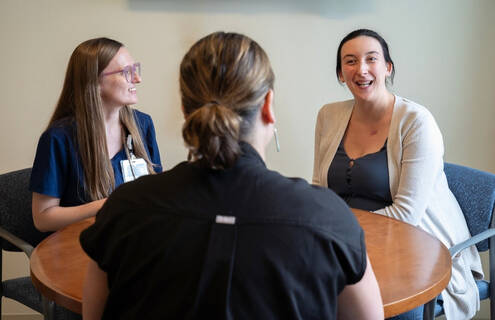
It's essential that patients receive high-quality, evidence-based, and collaborative care. APRNs contribute to this in many ways.
Jennifer Tabiri, APRNThe right hand of any care team, Advanced Practice Registered Nurses (APRNs) are dedicated professionals who provide compassionate and comprehensive care to patients with cancer throughout their treatment journeys.
In this Q&A, Jennifer Tabiri, APRN, explains her vital role on the Gynecologic Cancer Program team at Dartmouth Cancer Center (DCC), what brought her here, and why she got into oncology nursing in the first place.
Q: Who is on the Gynecologic Cancer team at DCC? Are you the only APRN?
Tabiri: The Gynecologic Cancer Program team at DCC consists of four physicians, an inpatient physician assistant, and myself as an outpatient APRN. The “Gyn Onc” team cares for patients with gynecologic diseases including:
- Cervical cancer
- Gestational trophoblastic disease
- Ovarian, fallopian tube and primary peritoneal cancer
- Pelvic masses
- Uterine cancer (endometrial and sarcoma)
- Vaginal cancer
- Vulvar cancer
We also help women with early-stage disease as well as those concerned about genetic risk for developing gynecologic cancers. In addition to our clinical team, we have support staff and receptionists, all of whom are essential to ensuring our patients receive excellent, seamless care.
Right now I am the sole outpatient APRN on this team. Recognizing the valuable role an APRN plays in providing comprehensive and consistent patient care, from diagnosis through survivorship, the team welcomed me here a year ago in February 2024.
Q: What are an APRN’s qualifications? How do they differ from an RN or an MD?
Tabiri: An APRN starts by earning a bachelor’s degree in nursing and then a master’s degree in nursing. After completing the necessary education and clinical rotations, aspiring nurses must pass the National Council Licensure Examination (NCLEX) and apply for licensure. And then, to become an APRN, there's another national certification exam demonstrating competency in a specific specialty.
Both RN (Registered Nurse) and APRN licenses require continuing education to maintain them. While RNs provide essential hands-on care, APRNs have advanced education and training that allows us to provide a broader scope of care. These responsibilities might include managing illnesses, prescribing medications, and developing treatment plans in collaboration with physicians. An MD, of course, is a physician who has completed medical school and residency, focusing on diagnosis, treatment, and overall medical management.
Q: How does an APRN fit into a care team? What do you do that a patient might not see?
Tabiri: I actively participate in our chemo conferences and tumor board meetings, which occur several times each month. These meetings are held so that specialists from all disciplines can come together to discuss complex cases and develop individualized treatment plans for patients. I'm also involved in communication between pharmacists and nurses regarding patient care plans, ensuring things like orders and prescriptions are handled efficiently. These behind-the-scenes activities are what make coordinated and effective care possible.
Q: How do you interact with patients? Are you with them throughout treatment?
Tabiri: I typically meet patients in the early part of their active treatment journey. If they're undergoing chemotherapy, I often take part in their pre-chemotherapy appointments, usually alternating with their physician. I continue to see patients through their treatment and into surveillance, which is after they've completed treatment and are being monitored for recurrence. I also see patients for problem visits, whether that’s symptom management or post-operative complications. I really strive to be a consistent presence throughout their journey.
Q: Are you involved with patients who are on clinical trials?
Tabiri: While I haven't been directly involved with clinical trials yet, I would be able to assist with pre-chemotherapy appointments or post-treatment surveillance for patients participating in trials.
Q: How do APRNs help with “continuity of care”? What does that mean for patients?
Tabiri: Continuity of care starts with the patient and their individual needs. It's essential that patients receive high-quality, evidence-based, and collaborative care. APRNs contribute to this in many ways: We help ensure consistent and coordinated care among various healthcare providers, we maintain and organize communication regarding patient needs, and we build strong patient relationships, empowering each patient to advocate for themselves and helping them meet those needs.
Q: Why did you want to become an oncology nurse and what is your own philosophy of care?
Tabiri: My initial desire to become a nurse stemmed from the care my older sister received after she was diagnosed with end-stage renal disease as a teenager. Later, my mother's leukemia diagnosis solidified my drive to become an oncology nurse. I witnessed the support, comfort, and genuine care the nurses provided to both my mom and sister. I knew I wanted to help other families and patients in the same way. Those nurses helped us medically and emotionally during incredibly difficult times, and I’ll always be thankful.
Q: Where are you from, and what brought you to the Upper Valley? What do you like to do outside of work?
Tabiri: I'm from Thornton, NH, and currently live in Hooksett, NH. I completed my undergraduate clinical rotations at Dartmouth Hitchcock Medical Center (DHMC) while studying for my Bachelor of Science in Nursing (BSN) at Colby-Sawyer College in New London, NH. I then worked at Dartmouth Cancer Center as an inpatient oncology nurse before returning to school for my graduate degree.
When I’m not working, I enjoy spending time with my husband and our new baby girl, Rhaena! I also love hiking, swimming, photography, and going to the beach with family and friends.
Q: What’s one goal you have to make the Gynecologic Cancer team the best it can be?
Tabiri: My goal is to continue providing the best possible care and ensure patients always feel heard throughout their healthcare journey. It’s so important for patients to feel empowered and educated about their diagnosis and treatment plan.